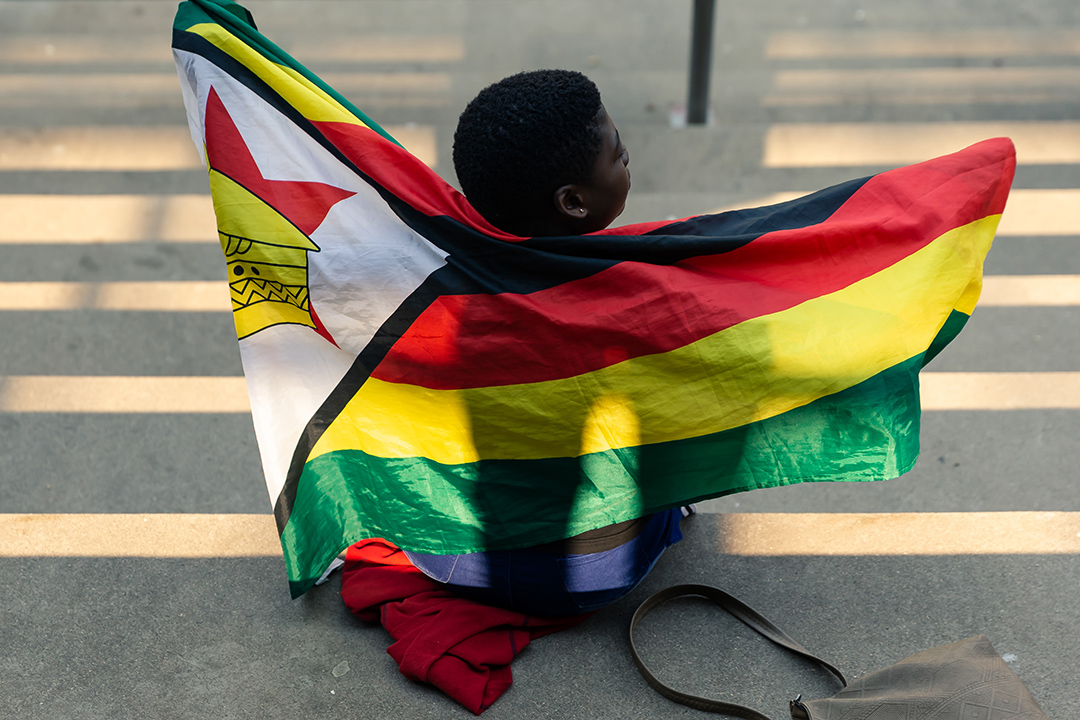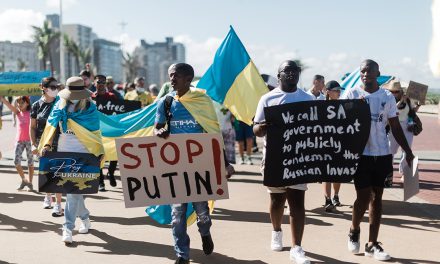As Zimbabwe counts down to the 2023 elections, civil society is again fighting for its very existence. The parliament has, since November 2021, been working towards the amendment of the Private Voluntary Organisations (PVO) Act. If passed, the amendments will provide the government additional and extensive powers to control how civil society organisations govern themselves. This poses a serious threat to the constitutionally enshrined principles of freedom of expression, association and assembly.

A child holds a Zimbabwe national flag as she sits at the National Sports stadium where the official funeral for the late Robert Mugabe was held in Harare, on September 14, 2019. Photo by Jekesai NJIKIZANA/AFP
The Bill is one of many initiatives to repress voices of dissent in a country that has long been in a state of political and economic crisis because of governance failures and mismanagement. It is also an effort to control the opposition’s voices ahead of next year’s general election, where the ruling Zanu-PF party could face an unprecedented challenge at the voters’ booth, and is indicative of the deteriorating relations between government and human rights and governance-focused civil society organisations.
The current state of the Bill
The Bill was first gazetted on 5 November 2021. It has gone through numerous public hearings and a second reading in parliament. It must still go through further parliamentary committee debates and a third reading before being passed in the house and sent for presidential assent to come into law. But the government seems intent on expediting its passing, citing growing concerns about money laundering and terrorist financing activities in the region, which the Bill is ostensibly meant to address.
The latest amendments to the Bill show the intention to criminalise civil societies’ financing of political parties and candidates, while also providing for civil penalties for civil society organisations that transact outside of official banking platforms.
How is the Bill being presented by the government?
The Bill is being presented as an amendment to the Private Voluntary Organisations Act (Chapter 17:05), which provides for the registration of private voluntary organisations and also “for the control of the collection of contributions for the objects of such organisations and of certain institutions, and for matters incidental thereto”.
According to its memorandum, the Bill has three purposes:
* To comply with recommendations made by the Financial Action Task Force;
* To streamline administrative procedures and allow for the efficient regulation and administration of PVOs; and
* To prevent PVOs from undertaking political lobbying.
But its vagueness and wide-ranging definitions extend the already problematic powers of the Act. Its focus goes beyond private voluntary organisations to include any “association of persons”, which can include trusts. Part b) of amendment clause 2 will empower the minister to compel any “association of persons” deemed to be at high risk to register as a PVO in terms of the proposed law.
This clause also entails a wide-ranging definition of funds or assets. For example, its amendment of section two of the Act on funds or other assets extends to “… any assets … economic, financial … property of every kind, whether tangible or intangible, movable or immovable, however acquired and legal documents and instruments in any form …” The limits or lack thereof are all at the discretion of the minister and likely to be arbitrarily applied to disable targeted organisations.
How could the proposed law be abused?
Nongovernmental organisations and civil society organisations already operate under significant legal constraints and are often the target of intimidation and coercion by security forces. In the latest targeted attacks, two state newspapers carried what has become that all too familiar accusation of NGOs as “agents of regime change”. The US-based National Endowment for Democracy is alleged to be funding these organisations through Botswana, Zambia and South Africa. The organisations are defined as Western proxies trying to unsettle Zimbabwe ahead of the 2023 elections (The Sunday Mail, 22 June, and The Herald, 25 June.
It is in this context that the parliamentary portfolio committee on public service, labour and social welfare is reported to have recommended a fast-tracking of the Bill to “prevent outside interference in elections”. But this Bill will give the government an unprecedented level of control over organisations’ financial and operational decision-making, and ultimately provide the government the power to cancel the registration of those that are designated as being involved in political activities.
In a detailed clause-by-clause analysis, the Zimbabwean legal research organisation Veritas identifies some of the critical amendments the Bill makes to the Act, which could be used against civil society.
Clause 2 (b) of the Bill accords the minister of public service, labour and social welfare discretionary powers to designate organisations as being at “high risk of, or vulnerable to misuse by terrorist organisations”. This clause also targets organisations’ source of funds and prohibits public or foreign funding for trusts. Currently trusts are registered under the high court and not under the PVO Act. The minister further stated during the second reading that trusts will be permitted to operate on “own wealth” but not foreign funding. A majority of trusts whose involvement in critical development, humanitarian and civic rights defence interventions rely on foreign funding and are all likely to have their operations prohibited through this clause.
Clause 5 will make a provision for a law that permits the PVO board to cancel the registration of a PVO if it is involved in political activities. This could lead to arbitrary deregistration of organisations, particularly governance and human rights defence organisations. As noted by Veritas, “‘it is almost impossible to discern what political activities will trigger cancellation” and runs contrary to civic participation as a tenet of promoting good accountable governance.
The International Centre for Not-for-Profit Law cautions against the Bill’s vague definition of PVOs and restrictions on trusts; its wide-ranging powers of national authorities to interfere with PVOs governance; the registrar’s extensive regulatory powers that include collecting fees from PVOs, which also extend to registration or rejection of applications as well as imposing civil penalty orders on non-complying PVOs, including for minor breaches. Clause 11 part 2 empowers the registrar to issue civil penalty orders for failure to comply with any provision of the proposed Act.
A history of efforts to restrict civil society
Legal efforts to undermine or restrict the activities of civil society are not new. Despite promises for reform made by President Emmerson Mnangagwa in his inaugural speech after the 2017 coup, this Bill shares many similarities to the Zimbabwean Non-Governmental Organisation Bill (NGO Bill), gazetted on 20 August 2004 under the administration of former president Robert Mugabe.
In a statement eerily similar to how the current Bill is being received by local and international civil society, a Human Rights Watch report published at the time argued that the 2004 Bill “will adversely affect, and effectively eliminate, all organisations involved in promoting and defending human rights. These organisations see themselves as nonpartisan. The government claims, without producing evidence, that many of them have abused Western donor funds to support the opposition party, the Movement for Democratic Change (MDC). Judging from the suspension of parliamentary standing orders to permit the passage of the Bill to be fast-tracked, the ruling party, Zanu-PF, appears to be in a hurry to pass the Bill ahead of the March 2005 general election.”
Although the NGO Bill of 2004 ultimately failed to get presidential assent, it still cast a crippling shadow of fear and anxiety that hindered NGO operations. Eighteen years later, the country’s legitimate nonprofit sector is back on that path of uncertainty. Instead of pursuing its important mandate, the sector must spend a significant amount of its time negotiating amendments to a proposed piece of legislation whose ultimate intent threatens its very existence.
Among a multiplicity of similarities, both Bills are presented as a necessary amendment to the PVO Act, and are products of the government’s intention to disable the funding sources of NGOs, limit civil liberties and hence evade scrutiny and accountability by governance and human rights watchdogs. Both Bills cite alleged abuse of Western donor funds by some NGOs to support the opposition, the MDC in 2004 and the Citizens Coalition for Change in 2022. As was the case in the run-up to the 2005 elections, there are calls and frantic efforts to fast-track the Bill ahead of the 2023 elections. There is therefore a history of the government’s sustained efforts at restricting governance and human rights focused NGOs.
PVO bill must be withdrawn, not amended
Prohibiting citizens from exercising their freedom of association and expression, right to demand accountable governance, whether individually or as part of civil society organisations of their choice, will further entrench the impunity characterising the ruling party. The proposed Bill will also reverse the gains attained so far through the nonprofit sector’s contribution to the global development agenda. The minister of justice, legal and parliamentary affairs, Ziyambi Ziyambi, in his speech during the Bill’s second reading, acknowledged in detail how these organisations are making a critical contribution to education and health, among other important goals.
He further used this same example to indicate that this proposed law is not targeted at what he termed “PVOs which operate lawfully within Zimbabwe” to “… provide support for communities in a wide range of areas where the national or local government for want of resources or expertise has been deficient for any reason … support and assistance in the form of programmes, projects, services, goods and money in such sectors as health and education provision, assistance to widows and orphans, the relief of poverty and hunger and the empowerment of women, youth and disabled”.
It is evident from the minister’s speech that not every organisation is targeted by this proposed law. His distinction between organisations deemed as “operating lawfully” and others apparently not doing so discriminates against governance and human rights-focused organisations, placing them directly in the line of attack. It is also evident from his speech that if passed in its current state, the designation of any targeted organisation as “high-risk” or “vulnerable to terrorism abuse” would place it at the risk of de-registration or reconstitution.
The Bill’s wide-ranging effect on civic freedoms, food security, education, social protection and health among others will only serve to compound an already dire socioeconomic and political situation. The harm on the already poor and marginalised citizens is likely to worsen in the run-up to the 2023 elections.
Conclusion
The government has cited the need to comply with the global Financial Action Task Force recommendations as the central purpose of the amendment. Although it is important to institute measures for countering terrorism and money laundering, the government must take heed of the United Nations Special Rapporteurs advice that legislation designed to do so is not used in the “singling out of the nonprofit organisations’ sector for more stringent regulations that incapacitate the sector and quell the freedoms of association and expression”.
The major provisions of the PVO Amendment Bill are designed to overregulate the civil society space rather than ensuring civil society organisations are not used for the financing of terrorism. Moreover, Zimbabwe already has policies — such as the Suppression of Foreign and International Terrorism Act 5 of 2007 (Chapter 11:25) — which, if effectively implemented, would effectively serve to combat terrorism and money laundering.
As civil society continues to advocate and lobby the government, a progressive way forward is for the government to address the legitimate concerns that have been tabled by civil society. Ultimately, it would be a prudent and strong governance signal for the government in its re-engagement efforts, to withdraw the Bill. The regional and international calls that include the aforementioned UN Special Rapporteurs joint communication, sent on 17 December 2021 to the president, is instructive in mapping a constitutionally appropriate way forward.
- This article first appeared on 22 July 2022.
Sikhululekile Mashingaidze entered the governance field in Zimbabwe while she was a part-time enumerator for the Mass Public Opinion Institute’s diversity of research projects during her undergraduate years. She has worked with the Habakkuk Trust, Centre for Conflict Resolution (CCR-Kenya), Mercy Corps Zimbabwe and Action Aid International Zimbabwe, respectively.







